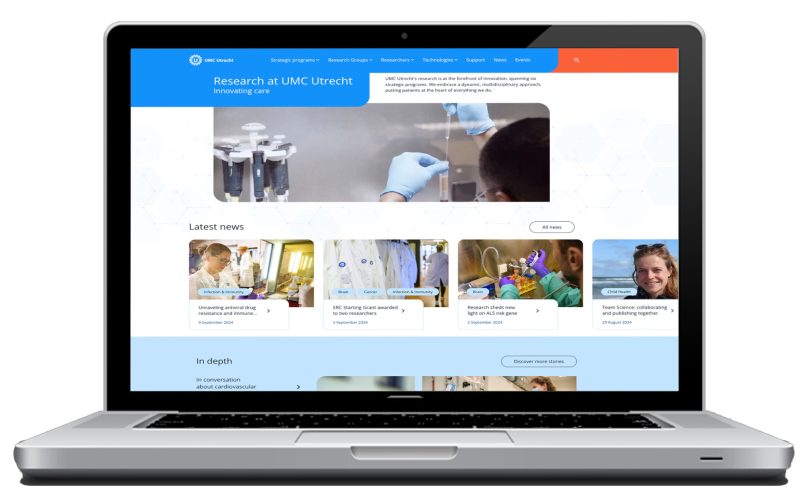Research at UMC Utrecht deserves to be visible, findable and presentable. Our brand new research website is the perfect platform as we are building an extensive presentation of all research groups, programs, publications, news, personal profiles and talent at UMC Utrecht. As a reflection of our research achievements and valorization, also this year many news articles have been published. In this overview, we present the top 10 of most popular scientific news articles posted on the UMC Utrecht research website in 2024.
The ranking below based on the number of unique visitors to a particular news item. The links below lead to the full articles.
Researchers from UMC Utrecht published a scientific article in The Lancet Global Health on severe RSV infections in young children in low-income countries. PhD student Yvette Löwensteyn made a remarkable choice for this publication. She gave up the first author position.
Researchers from UMC Utrecht have received the green light for a new study on stem cell therapy for newborns with brain damage. Thanks to a total grant of 5 million euros from Zorginstituut Nederland, ZonMw, the Brain Foundation Netherland s, and the Vrienden UMC Utrecht & Wilhelmina Children’s Hospital, the effectiveness of this promising therapy can now be tested.
Less radiation sessions with the MR-Linac. And with even more precision. This is not only less stressful for patients with prostate cancer, but also ensures that more patients can be treated more quickly. UMC Utrecht will now investigate whether two radiation sessions should become the new standard treatment.
Niels Eijkelkamp has been appointed as professor of Neuroimmunology of Pain at Utrecht University/UMCU Utrecht, effective October 15, 2024. The chair will be embedded in the strategic research program Infection & Immunity. In this role, Niels Eijkelkamp will advance his research effort to address the critical need for a deeper understanding of chronic pain. By developing and sharing fundamental knowledge on the interaction between the immune and nervous systems in the context of chronic pain, he aims to translate these insights into urgently needed new medications, diagnostic tools, and prognostic methods for chronic pain.
Treating patients with cancer faster and more effectively using the latest minimally invasive techniques. While at the same time relieving the continuing pressure on the healthcare system. That’s what IMAGINE is striving for. The NWO, public and private partners are investing a total of 54 million euros in this world-leading innovation lab for image-guided interventions. This will significantly improve the lives of and care for people with cancer.
Research into brain diseases frequently concentrates on neurons, yet they might only reveal part of the story. Rather, the helper cells known as glia could hold the answers to the disrupted neuronal communication seen in numerous brain diseases. Specifically, an upregulated state of glia known as reactive gliosis is suspected to be a key pathological factor in disease onset and progression. Now, a new BRAINS grant will support a four-year study into the behavior of glial cells in various brain diseases such as dementia, MS, epilepsy and other neurological diseases.
Laboratory studies in the PhD research project by Chilam Chan (UMC Utrecht) show that immunoglobulin A (IgA)-based antibodies can effectively activate neutrophils to fight cancer, and offers a promising alternative for patients who do not respond to IgG-based monoclonal antibodies in the treatment of cancer.
Of every five patients admitted to the intensive care unit (ICU) with a severe pneumonia caused by influenza, one will not survive. To reduce this relatively high mortality risk, Dutch researchers lead by University Medical Center Utrecht will investigate drugs that were previously successful in treating patients with severe Covid-19 entering the ICU, now also in ICU patients with severe pneumonia due to influenza. Dutch funding agency ZonMw has provided a grant of more than €2.1 million for this study.
International research shows that kidney patients experience a better quality of life with the dialysis treatment hemodiafiltration. Kidney patients have a lower risk of death with this dialysis method than with standard hemodialysis. The higher the dose of hemodiafiltration, the lower the risk of death. This is evident from two studies led by UMC Utrecht. The results of the studies were recently published in Kidney International and The Lancet, and are expected to lead to wider global application of hemodiafiltration.
Previous studies on the airway microbiome have primarily focused on young children or individuals with respiratory diseases. However, a comprehensive study in a healthy population across all age groups was still lacking. For the first time, researchers from UMC Utrecht, the National Institute for Public Health and the Environment (RIVM), Utrecht University, and the University of Edinburgh (UoE) have investigated this and recently published their findings in the prestigious journal Cell.
Read more research news